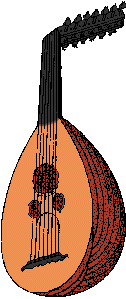: a stringed instrument having a large pear-shaped body, a vaulted back, a fretted fingerboard, and a head with tuning pegs which is often angled backward from the neck
transitive verb
: to seal or cover (something, such as a joint or surface) with lute
: a substance (such as cement or clay) for packing a joint or coating a porous surface to make it impervious to gas or liquid
Subscribe to America's largest dictionary and get thousands more definitions and advanced search—ad free!
Merriam-Webster unabridged
